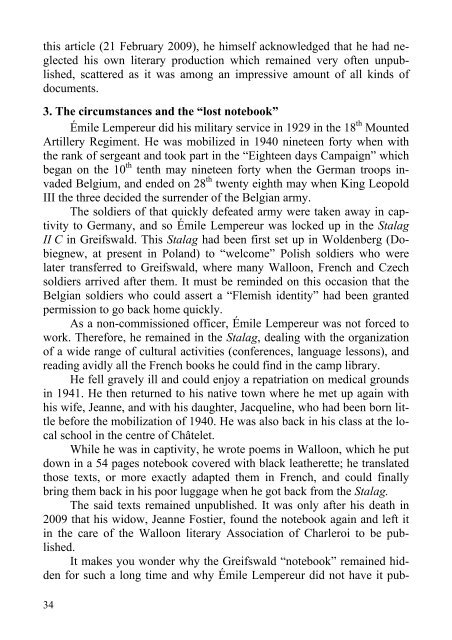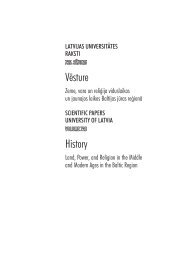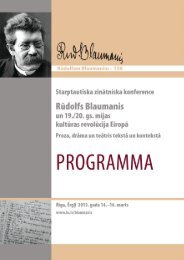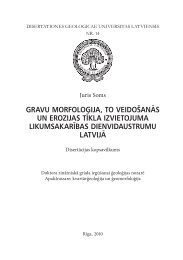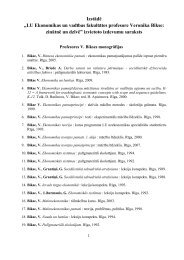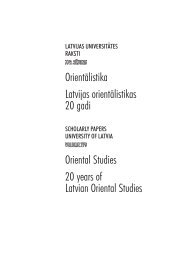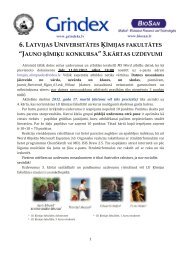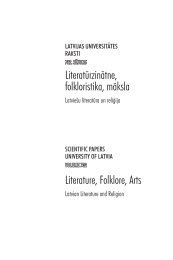- Page 1 and 2: RĒZEKNES AUGSTSKOLA Via Latgalica
- Page 3 and 4: Prīškvuordi 2010. goda 21.-22. ok
- Page 5 and 6: Irina Bakhmutova (Europäische Univ
- Page 7 and 8: Deutschland übersiedelten. Die let
- Page 9 and 10: zu sprechen. Es gehörte zum Komple
- Page 11 and 12: Wieviel „Mundartliches“ reicht
- Page 13 and 14: Franča Kempa ābeču nozīme latga
- Page 15 and 16: Pagaidām tās nav atrastas; nav ra
- Page 17 and 18: Seko zilbju mācība, norādot, ka
- Page 19 and 20: 6. att. 19
- Page 21 and 22: ābeces posmā parasti netiek māc
- Page 23 and 24: Ņesterovs 1974 — O. Ņesterovs.
- Page 25 and 26: 1. Weitreichende Entsprechungen, d.
- Page 27 and 28: aber stellen keineswegs einen Beleg
- Page 29 and 30: (14) nd. So wüssten wi jo denn nu
- Page 31 and 32: LSWR — L. Röhrich. Lexikon der s
- Page 33: 2. Émile Lempereur He was born in
- Page 37 and 38: about which the author chose a much
- Page 39 and 40: In the texts where the author evoke
- Page 41 and 42: Ingars Gusāns (Rēzeknes Augstskol
- Page 43 and 44: Pirmās asociācijas par albumu nos
- Page 45 and 46: Paprosit maņ — kas es asmu, kur
- Page 47 and 48: Kā noteicošo faktoru grupas dzies
- Page 49 and 50: TOĻIKS, Ar sāpēm un piespiešano
- Page 51 and 52: 3) visbiežāk jauniešos veidojas
- Page 53 and 54: Maikls Hornsbijs (Michael Hornsby)
- Page 55 and 56: tīva, ka daudzi poļi joprojām ir
- Page 57 and 58: definēts un palika neskaidrs, lai
- Page 59 and 60: lodu, sazinoties mājās“ 17 . Va
- Page 61 and 62: (Attiecīgi tiek piemēroti 18. pan
- Page 63 and 64: 15. pantā noteiktas finansiālās
- Page 65 and 66: eģionālajām un mazākumtautību
- Page 67 and 68: dos, kā arī Glodnicas sākumskol
- Page 69 and 70: Hentschel 2003 — G. Hentschel. Ne
- Page 71 and 72: Gabriele Iannàccaro (University of
- Page 73 and 74: Dialectometry is a well-known branc
- Page 75 and 76: they read books and newspapers. Mor
- Page 77 and 78: eality. In order to do that we must
- Page 79 and 80: 0.8-0.9 diglossia L1/L2 vs. digloss
- Page 81 and 82: means of oral and written communica
- Page 83 and 84: Map 2: Sociolinguistic division of
- Page 85 and 86:
Area Id Distance Aglona ar. 126 0,2
- Page 87 and 88:
Map 4: sociolinguistic borders and
- Page 89 and 90:
References Dell’Aquila 2005 — V
- Page 91 and 92:
Trudgill 1983 — P. Trudgill. On D
- Page 93 and 94:
these claims are gaining momentum.
- Page 95 and 96:
These three questions were chosen i
- Page 97 and 98:
2. strengthening code: the middle a
- Page 99 and 100:
factor of language change across ge
- Page 101 and 102:
for administration purposes, while
- Page 103 and 104:
loses 5 points in the elections: th
- Page 105 and 106:
going or tends to undergo considera
- Page 107 and 108:
Map 10: IGVI [general] A number of
- Page 109 and 110:
een reduced to four and the eleven-
- Page 111 and 112:
(Brigi), use of Russian with childr
- Page 113 and 114:
Peeters, Yvo and Colin Williams (ed
- Page 115 and 116:
ūtiskāko etniskās identitātes s
- Page 117 and 118:
muocītu vysa pasauļa gudrību, zy
- Page 119 and 120:
Koncepta vuords loma valodas un run
- Page 121 and 122:
šķirts no reālās pasaules, atro
- Page 123 and 124:
māciju par stāstīšanas kā proc
- Page 125 and 126:
pasakās lietots 405 reizes. Lūgš
- Page 127 and 128:
sakas sižetiskā risinājuma atkar
- Page 129 and 130:
LTdz 1952 — A. Švābe, K. Straub
- Page 131 and 132:
Ieva Kalniņa (Latvijas Universitā
- Page 133 and 134:
Rimants Ziedonis latviešu literat
- Page 135 and 136:
nāca uz robežsargu sporta pasāku
- Page 137 and 138:
Nozīmīgu vietu grāmatā „Austr
- Page 139 and 140:
Autoru interesē aktīvi uzņēmēj
- Page 141 and 142:
eligious buildings, houses and vill
- Page 143 and 144:
Pētāmais jēdziens sādža 42 un
- Page 145 and 146:
Jezups sādža Jī dzeivōja saspī
- Page 147 and 148:
2-3 hektārus lielas saimniecības
- Page 149 and 150:
Jāatzīmē, ka sādžinieku vidū
- Page 151 and 152:
nāšanu, lētticību; tāpat neaud
- Page 153 and 154:
economic life in rural Latgale rela
- Page 155 and 156:
search I obtained information from
- Page 157 and 158:
6 th and 9 th grade and mastered Ö
- Page 159 and 160:
Övdalian in the light of the Europ
- Page 161 and 162:
financial support, the problem of d
- Page 163 and 164:
European Charter for Regional or Mi
- Page 165 and 166:
Sandra Meškova (Daugavpils Univers
- Page 167 and 168:
The motifs of being on the road, jo
- Page 169 and 170:
The ironic overtone of the poem end
- Page 171 and 172:
of subjectivity, resolving the risk
- Page 173 and 174:
plays, etc. However, it is not the
- Page 175 and 176:
Aldis Miņins (Latvijas Universitā
- Page 177 and 178:
atainošanā mākslas un dokumentā
- Page 179 and 180:
No 1897. gada tautskaitē Latvijas
- Page 181 and 182:
II Nacionālisms, ar ko tiek sapras
- Page 183 and 184:
nacionālās atmodas laikā no druk
- Page 185 and 186:
u jāpateicas vēstures literatūr
- Page 187 and 188:
nepārvaramām barjerām), kas atda
- Page 189 and 190:
turniks nu latwišu tautas. Jo word
- Page 191 and 192:
VI Valoda bija tā, kas tika pasnie
- Page 193 and 194:
lodu ir pieaugusi, ko apliecina per
- Page 195 and 196:
Kalvāne 1997 — S. Kalvāne. Latg
- Page 197 and 198:
Latgale and Latgalians: Myths and H
- Page 199 and 200:
vados un 2 republikas nozīmes pils
- Page 201 and 202:
25,00 20,00 20,45 15,00 10,00 5,00
- Page 203 and 204:
zes 700. numura iznākšanas dienā
- Page 205 and 206:
formātā. Otrkārt, tas norāda, k
- Page 207 and 208:
tules uz Kaliforniju, paužot satī
- Page 209 and 210:
statuss, nacionalitāte, etniskā p
- Page 211 and 212:
preses tekstu iekšējā līmenī,
- Page 213 and 214:
nu runāt un rakstīt latgaliešu v
- Page 215 and 216:
Arvīda Aizsila Latgales folkloras
- Page 217 and 218:
„Celsim godā veco labrītu!“ (
- Page 219 and 220:
pamatā veido latviešu tautasdzies
- Page 221 and 222:
tieniem. Šie centieni nerima arī
- Page 223 and 224:
gasta Lejas Bokstu Zirņu Jura. Uz
- Page 225 and 226:
Lubānas barons Celmiņu esot pabal
- Page 227 and 228:
4. Latviešu folkloras krātuvei no
- Page 229 and 230:
15. FK. 12. iesūtījums. (06.10.19
- Page 231 and 232:
savus mūža beidzamos gadus. Vai d
- Page 233 and 234:
Literārs darbs latgaliski autorīb
- Page 235 and 236:
Lōcs. (..) 1989. g. atkal sāk izn
- Page 237 and 238:
— Gribieju sev daruodeit, ka vari
- Page 239 and 240:
Tātad — „Pasaules atklāsme“
- Page 241 and 242:
es rakstīju tajā. Man, tāpat kā
- Page 243 and 244:
le un darbos iekļautās identitāt
- Page 245 and 246:
Hanovs 2008 — D. Hanovs. Cita zem
- Page 247 and 248:
Solvita Pošeiko (Rēzeknes Augstsk
- Page 249 and 250:
latgaliešu valodas lietojumu, nepi
- Page 251 and 252:
izveidotāja un adresāta, gan arī
- Page 253 and 254:
latvietis un latgalietis. Daļa res
- Page 255 and 256:
65), ko raksturo moderna un kosmopo
- Page 257 and 258:
mu nepārzināšana, nevēlēšanā
- Page 259 and 260:
popularizēt, piemēram, medijos la
- Page 261 and 262:
grāfiskās kultūras saglabāšana
- Page 263 and 264:
Rēzekne: 9 — S. Pošeiko. Interv
- Page 265 and 266:
language, local companies’ focus
- Page 267 and 268:
Raksta mērķis — raksturot lingv
- Page 269 and 270:
aksturojumam īpaši svarīgs likā
- Page 271 and 272:
3. Īsa enciklopēdiska uzziņa par
- Page 273 and 274:
Tirgus ievieš korekcijas savs-sve
- Page 275 and 276:
questionnaire data and of each part
- Page 277 and 278:
Satura ruodeituojs Prīškvuordi ..


